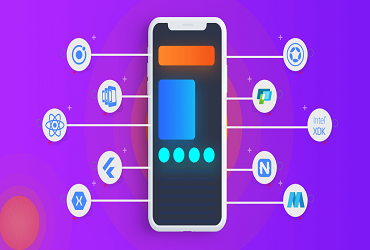Mobile app development Services process of creating software applications in Phnom Penh Cambodia and Local and International Clint specifically designed to run on mobile devices such as smartphones and tablets. These applications commonly referred to as mobile apps, serve a wide range of purposes and provide a direct means for users to interact with digital content and services. we give some detail an overview of mobile app development:
1- Native App Development: Native apps are designed for a specific mobile operating system such as iOS (Apple) or Android. Developers use platform-specific programming languages (Swift or Objective-C for iOS Java or Kotlin for Android) to create these apps & Native apps offer the best performance and user experience local and International .
2- Cross-Platform App Development: Cross-platform apps are developed using a single codebase and can run on multiple operating systems. Tools like React Native Flutter and Xamarin enable developers to create apps that work on both iOS and Android reducing development time and costs.
3- Hybrid App Development: Hybrid apps combine elements of both native and web apps. They are built using web technologies like HTML CSS and JavaScript and are often wrapped in a native shell. While hybrid apps are cost-effective and easier to maintain they may not provide the same performance as native apps.
4- App Design: A crucial aspect of mobile app development is user interface (UI) and user experience (UX) design. A well-designed app is intuitive visually appealing, and user-friendly making it more likely to engage and retain users.
5- Mobile App Testing: Rigorous testing is essential to identify and resolve bugs, glitches, and performance issues. App testing includes functional testing usability testing, and compatibility testing across various devices and operating systems.
6- App Security: Mobile app developers must prioritize security to protect user data and prevent vulnerabilities. This includes data encryption secure authentication methods and regular security updates.
7- App Store Submission: Mobile apps need to be submitted to app stores like Apple’s App Store and Google Play for review and approval. Developers must adhere to guidelines and policies to ensure their apps are accepted and published.
8- Continuous Updates: Mobile app development doesn’t end with the app’s launch. Regular updates are essential to add new features improve performance fix bugs and enhance security.
9- Backend Development: Many mobile apps require a backend server to handle tasks like user authentication data storage and real-time updates. Backend development is essential for apps that rely on server-side functionality.
10- APIs and Integrations: Mobile apps often integrate with external services and APIs to provide additional features. Integrations can include social media sharing payment gateways location services and more.
11- App Monetization: Developers can choose various monetization strategies for their apps including in-app advertisements in-app purchases subscription models or selling the app itself.
12- User Feedback and Support: Successful app developers actively seek and respond to user feedback. Regularly engaging with users helps identify areas for improvement and builds user loyalty.
13- App Marketing and Promotion: Launching an app is just the beginning. Effective marketing and promotion strategies are essential to reach and attract users. This can involve social media marketing search engine optimization (SEO) and paid advertising.
14- App Performance Optimization: Developers continually optimize their apps to ensure they run smoothly, consume fewer resources and provide a positive user experience.
Summary
mobile app development is a multifaceted process that involves planning design coding testing, and ongoing maintenance. Mobile apps have become integral to modern life offering solutions for communication productivity entertainment, and much more. As technology continues to evolve mobile app development will remain at the forefront of innovation shaping the future of mobile technology.








